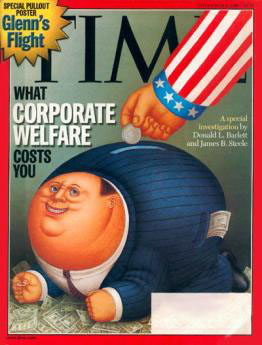
"We're all Socialists Now!"
That was the tongue in cheek declaration of Air America's Sam Seder, as he blogged about the AIG-FP bailout that shook up Wall St. This after the Fed decided to rescue the flailing insurance giant to the tune of $85 billion--right out of the tax-payers pockets. All of this following on the heels of the Bear Stearns and Freddie Mac & Fannie Mae bailouts. It seems after years of decrying regulation, of blathering on about socialized medicine and the need to keep the free market "free"--America has decided that socialism, at least for the rich during a crisis, ain't such a bad idea.
As John Amato over at Crooks & Liars put it:
Conservatives tell individuals to pick yourself up off the floor and do something with your life you welfare queen. Well, when it happens to Wall Street—the corporations come begging to us and get bailed out. This is all very complicated stuff, but it proves the fallacy of conservatism. There are times when the government should step in, but for conservatives that should never happen for the average worker. Only rich fat cats like Carly Fiorina should ever be graced with help.
Say, weren't there some geniuses a short while ago saying we should toss over social security to these guys?
The front of the NY Sun summed it up in a stark headline--America Nationalizes AIG Group. Nationalization, that evil destroyer of free markets and used by godless "dictators" in Venezuela and Boliva, has come to America. Only, unlike the socialist experiments in Latin America that seek to distribute wealth to the poor, America's nationalization seeks to keep the economic status quo churning on. Though if the 450 point plunge the stock market took at news of AIG's bailout is any predictor, may be the status quo ain't buying it.
Writing in the Christian Science Monitor, Paul Grier noted:
The great financial shakeout of 2008 – one of the most dire US fiscal crises of modern times – is likely to change permanently the relationship between Wall Street and Washington....a long period of Washington laissez faire toward financial markets may well be at an end. The details of regulation could be different, depending on which candidate wins the White House this fall. But more US oversight seems inevitable.
If that nasty "regulation" is making a comeback no matter who gets into the oval office, it will be a paradigm shift for at least one of them.
As Tom Teepen notes in the Seattle Post Intelligencer:
Talk about your battlefield conversions. With financial bombs going off all over the landscape, John McCain -- with rare exceptions a lifelong foe of government regulation -- has seen the light. Where just last March he was telling The Wall Street Journal, "I am always for less regulation," now he is promising, though without saying just how, to end the "reckless conduct, corruption and unbridled greed" of Wall Street.
The Washington Post takes note as well:
A decade ago, Sen. John McCain embraced legislation to broadly deregulate the banking and insurance industries, helping to sweep aside a thicket of rules established over decades in favor of a less restricted financial marketplace that proponents said would result in greater economic growth. Now, as the Bush administration scrambles to prevent the collapse of the American International Group (AIG), the nation's largest insurance company, and stabilize a tumultuous Wall Street, the Republican presidential nominee is scrambling to recast himself as a champion of regulation to end "reckless conduct, corruption and unbridled greed" on Wall Street.
So McCain goes straight from anti-regulation to a supporter when the political wind blows his way--and hopes no one notices. For his part, Obama did not begin talking about the effects of derregulation until earlier this year. But unlike McCain he did not vote consistently against regulation. Nor does he come with the baggage of actually being the guy who helped do away with regulation across the board.
The question here of course is, since the people are now the proud owners of these financial institutions, what are we going to get from this? The answer is, likely nothing. But it does show us one thing--that whole talk about the magical free market has been proven devoid of reality.
Economist and writer Max Fraad Wolff sums it all up nicely:
I mean, we’re watching the death of the free market ideology. It hasn’t been announced. But increasingly, the policies, the way we talk, the way we make legislation all but formally abandons the notion that the market can do it right, the government will do it wrong, and that government intervention is a bad idea. It turns out that government intervention is a bad idea, unless you want and need money from the government, in which case it becomes a fine idea, and bring on the government cash. So it might be unfortunate when somebody who’s having a tough time in their life wants a free piece of cheese, but when a bunch of executives want a free $100 billion, it turns out that’s the kind of government intervention we can all get behind, we can all believe in.
So does this mean Milton Friedman and his "sound" economic theories are dead?
Not. A. Chance. That ideology is now taken almost as an article of faith by too much of the financial and economic world. It will probably take a few more body blows before they admit the inherent flaws of an unrestrained free market. Unfortunately, the rest of us will have to go along for the ride.



No comments:
Post a Comment